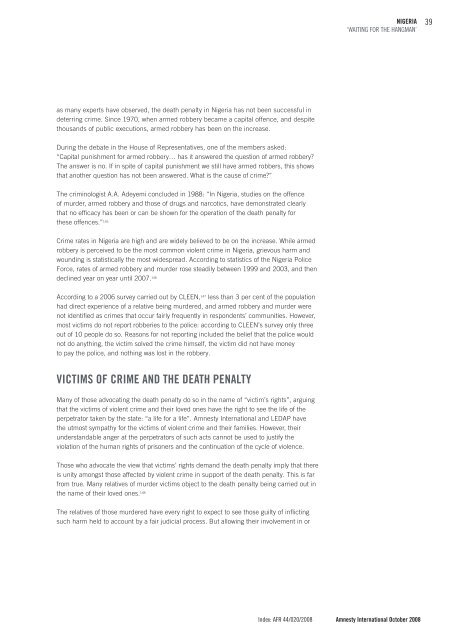read the report - Amnesty International
read the report - Amnesty International
read the report - Amnesty International
Create successful ePaper yourself
Turn your PDF publications into a flip-book with our unique Google optimized e-Paper software.
NIGERIA<br />
‘WAITING FOR THE HANGMAN’<br />
39<br />
as many experts have observed, <strong>the</strong> death penalty in Nigeria has not been successful in<br />
deterring crime. Since 1970, when armed robbery became a capital offence, and despite<br />
thousands of public executions, armed robbery has been on <strong>the</strong> increase.<br />
During <strong>the</strong> debate in <strong>the</strong> House of Representatives, one of <strong>the</strong> members asked:<br />
“Capital punishment for armed robbery… has it answered <strong>the</strong> question of armed robbery?<br />
The answer is no. If in spite of capital punishment we still have armed robbers, this shows<br />
that ano<strong>the</strong>r question has not been answered. What is <strong>the</strong> cause of crime?”<br />
The criminologist A.A. Adeyemi concluded in 1988: “In Nigeria, studies on <strong>the</strong> offence<br />
of murder, armed robbery and those of drugs and narcotics, have demonstrated clearly<br />
that no efficacy has been or can be shown for <strong>the</strong> operation of <strong>the</strong> death penalty for<br />
<strong>the</strong>se offences.” 145<br />
Crime rates in Nigeria are high and are widely believed to be on <strong>the</strong> increase. While armed<br />
robbery is perceived to be <strong>the</strong> most common violent crime in Nigeria, grievous harm and<br />
wounding is statistically <strong>the</strong> most widesp<strong>read</strong>. According to statistics of <strong>the</strong> Nigeria Police<br />
Force, rates of armed robbery and murder rose steadily between 1999 and 2003, and <strong>the</strong>n<br />
declined year on year until 2007. 146<br />
According to a 2006 survey carried out by CLEEN, 147 less than 3 per cent of <strong>the</strong> population<br />
had direct experience of a relative being murdered, and armed robbery and murder were<br />
not identified as crimes that occur fairly frequently in respondents’ communities. However,<br />
most victims do not <strong>report</strong> robberies to <strong>the</strong> police: according to CLEEN’s survey only three<br />
out of 10 people do so. Reasons for not <strong>report</strong>ing included <strong>the</strong> belief that <strong>the</strong> police would<br />
not do anything, <strong>the</strong> victim solved <strong>the</strong> crime himself, <strong>the</strong> victim did not have money<br />
to pay <strong>the</strong> police, and nothing was lost in <strong>the</strong> robbery.<br />
VICTIMS OF CRIME AND THE DEATH PENALTY<br />
Many of those advocating <strong>the</strong> death penalty do so in <strong>the</strong> name of “victim’s rights”, arguing<br />
that <strong>the</strong> victims of violent crime and <strong>the</strong>ir loved ones have <strong>the</strong> right to see <strong>the</strong> life of <strong>the</strong><br />
perpetrator taken by <strong>the</strong> state: “a life for a life”. <strong>Amnesty</strong> <strong>International</strong> and LEDAP have<br />
<strong>the</strong> utmost sympathy for <strong>the</strong> victims of violent crime and <strong>the</strong>ir families. However, <strong>the</strong>ir<br />
understandable anger at <strong>the</strong> perpetrators of such acts cannot be used to justify <strong>the</strong><br />
violation of <strong>the</strong> human rights of prisoners and <strong>the</strong> continuation of <strong>the</strong> cycle of violence.<br />
Those who advocate <strong>the</strong> view that victims’ rights demand <strong>the</strong> death penalty imply that <strong>the</strong>re<br />
is unity amongst those affected by violent crime in support of <strong>the</strong> death penalty. This is far<br />
from true. Many relatives of murder victims object to <strong>the</strong> death penalty being carried out in<br />
<strong>the</strong> name of <strong>the</strong>ir loved ones. 148<br />
The relatives of those murdered have every right to expect to see those guilty of inflicting<br />
such harm held to account by a fair judicial process. But allowing <strong>the</strong>ir involvement in or<br />
Index: AFR 44/020/2008 <strong>Amnesty</strong> <strong>International</strong> October 2008

















